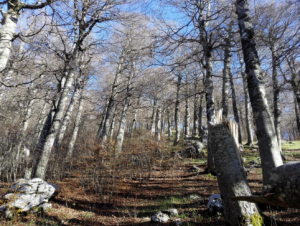Lessons from the wild: slow but increasing long‐term growth allows for maximum longevity in European beech
By Gianluca Piovesan
5/28/2019

Photo credit: Gianluca Piovesan
Beech trees older than 600 years discovered in the Pollino Massif: This high-mountain old-growth Mediterranean forest harbors the oldest deciduous hardwoods.
Discovering, studying, and preserving old trees is a top priority for conservation biology and sustainable development.
We used tree-ring data from a high-mountain old-growth Mediterranean beech forest to reconstruct long-term growth patterns in trees of maximum longevity for temperate hardwoods. The study site, located in the Pollino National Park – southern Italy – is very close to the southernmost component of the UNESCO network of ancient and primeval beech forests of Europe.
“In these stands, characterized by a complex uneven-aged structure, individual growth history is highly variable; one tree can take from one to seven centuries to reach a large size (>60 cm of diameter at breast height). Here, large canopy gaps are soon filled by dense regeneration, and slow growth rates in early life due to high competition are also linked to long life spans in undisturbed environments,” says Gianluca Piovesan, the leading author of the research.
Read more here: https://www.unitus.it/publi
c/platforms/1/cke_contents/4851/Ecology%20piovesan%20press%20release%20new.pdf